|
CMC to take legal action against city hotels:
Stringent measures on food safety
By Ranil WIJAYAPALA
|
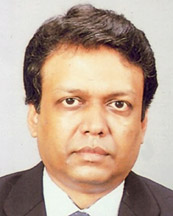
Dr. Pradeep Kariyawasam
|
A tourist or a local who visits Colombo to attend to his or her needs
will be confused with the wide range of hotels and eating houses in the
city as to which hotel they should go in to have a proper meal.The
beautifully decorated city hotels covered with nicely laid out tables
and curtains alone won't help them to decide whether the place is safe
to have a meal. Not only to have a meal but also to buy some apples or a
bunch of grapes they will have to be extra careful as some vendors use
chemicals for these fruits.
The recent raids carried out by the Public Health Department of the
Colombo Municipal Council along with the Environmental Police, revealed
that many hotels in Colombo are selling unhygienic food.Legal action are
pending for 282 eateries in the Colombo city of 814 eating houses raided
by the CMC Public Health Department and the Environment Police Unit
during the past few weeks.
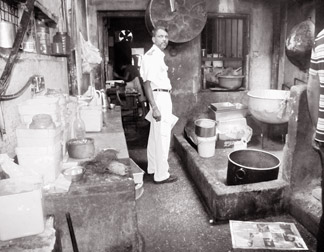 Over 300 Kilo grams of fruits and more than a tonne of food including
400 Kgs of 'godamba rotti' stored in hotel refrigerators to prepare 'Kottu',
were destroyed by the food inspectors following these raids which bear
testimony that the taste is not the only factor for the hygiene of the
meal that they consume from these eateries.Colombo, as a city that is to
undergo a vast development drive very soon, have to think of new ways of
monitoring the hygienic conditions of these city hotels and eating
houses. Over 300 Kilo grams of fruits and more than a tonne of food including
400 Kgs of 'godamba rotti' stored in hotel refrigerators to prepare 'Kottu',
were destroyed by the food inspectors following these raids which bear
testimony that the taste is not the only factor for the hygiene of the
meal that they consume from these eateries.Colombo, as a city that is to
undergo a vast development drive very soon, have to think of new ways of
monitoring the hygienic conditions of these city hotels and eating
houses.
Food Act
Under the Food Act of 1980 which was amended in 1991, the Chief
Medical Officer of the CMC Public Health Department is the sole
authority to handle all food control activities in the city.
Talking about the Food Control Activities in the city Dr. Pradeep
Kariyawasam says that food hygiene has become a very complex problem all
over the world and it has also become a challenging task to the Colombo
Municipal Council.
"It is very difficult for us to act only according to the by-laws of
the Municipal Ordinance as the standards given these bylaws are not
enough to maintain internationally accepted standards of food hygiene",
Dr. Kariyawasam said.
"I remember ten years ago I started food control activities and I
realised when we visited five star hotels, their standards were very
low. They have given least priority to the kitchens whilst spending huge
sums for outward appearance", he says. "True that under the Municipal
Council Ordnance and the by-laws with regard to eating houses, there
were conditions. But those are outdated now", he said.
Under the Food Act, action can be taken against the preparation of
food.
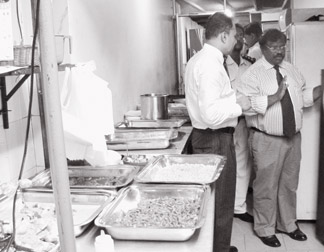
CMC officials inspect hotels in the Colombo city |
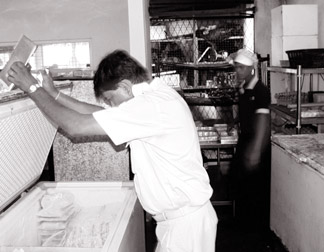
Taking a closer look... |
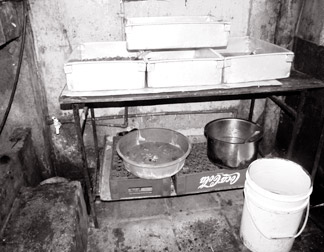 |
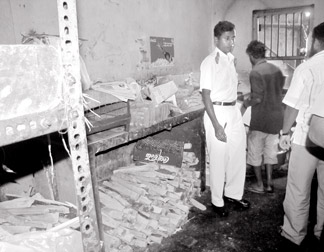 |
 |
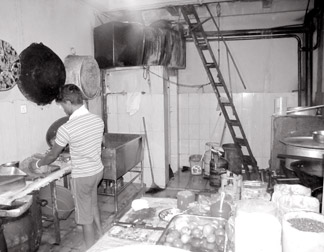 |
"But I think to Food Act should gradually undergo amendments. I think
they should now include more conditions to regulate hotels and eating
houses," he added.
As a part of the program to improve the hygienic level of the city
hotels the Colombo Municipal Council launched a program to grade the
city hotels and eating houses. But out of over 1,000 hotels and
restaurants in the city only 150 got A and B grades.
The CMC Public Health Department commenced even checking the water,
from where it is being taken and the food prepared. The Department
checked the health conditions of the workers, blood, urine and the
stools to ensure that the place is safe.
"This year we have given Grade A and B certificate, for 150 places",
he added.
Only 400 city hotels are having basic licence to operate hotels. To
obtain a licence they should have the approval from the Urban
Development Authority to run a hotel or eating house and fire brigade
certificate to conform to their rules and regulations and a certificate
from the Public Health Department that the sanitary conditions are good.
But beyond that there are no conditions.
"The other eating houses and hotels are operated without the licence",
Dr. Kariyawasam added.
"So going I think we should now change this, because the country is
under development and one of the cornerstone is the arrival of more
tourists. The development is based on that. I think to cater to that we
should have very good hotels and eateries", Dr. Kariyawasam added. So
the Colombo Municipal Council also has to increase surveillance to check
the conditions of hotels and to see that these places are safe not only
to tourists but also for to locals. "So we have to see that they have
very good hygienic standards. Our effort is that", Dr. Kariyawasam
added.
Therefore, the CMC started another program with to United Nations
Industrial Development Organisation which worked with the National
Chamber of Commerce and the Ceylon National Chamber of Industries
creating a non profit private firm, Ind-Expo Pvt. Ltd.
This firm signed an agreement with the Colombo Municipal Council to
run a program called Crowns for Food Hygiene and to train the staff and
also grade food establishment."In that we are very strict and get the
food establishments audited by their own staff and our own staff. So far
they have given crown only to about three or four places. To obtain this
they have to apply for the certificate. Even a canteen operator could
apply for the program", he said.
Dr. Kariyawasam says that the hygienic conditions of the eating
houses should be further increased by checking the health condition of
the food handlers.
The Food Act only says to check their stools. I think it is high time
to check blood for hepatitis, typhoid, and even for sexually transmitted
diseases because some countries are checking these workers for HIV
also", Dr. Kariyawasam added.
All these time most of the hotels when they want the Tourist Board
licence they get their workers medically checked. But that is a routine
medical check-up. Maximum they are would do is to check the stools.But
to upgrade these standards and check-ups the laboratories where they
test food samples should also be upgraded.
"So we have to improve the laboratory system. For this we have to
spend a lot. That is true. But it is good that we spend some money and
improve the laboratory system to ensure safety. Then we can take
corrective measures", he added. "When something is found spoilt only the
lab can say this is spoilt. Then we can find how and why this had
happened", Dr. Kariyawasam added.
For example we can check what type of germs that the food samples
have. So we can talk to them and find out how these germs have entered
these food samples. Some germs are either from the water from the meats
or from the air. "Like that we can find out how it came to the product.
So it is very important to have upgraded laboratories", he added.
"But we are facing difficulties in obtaining funds to upgrade
laboratories. Funds are not readily available. We have also asked the
UNIDO to help us to upgrade the laboratories", he added.
Safe meal
"But the most important factor for the public is the way of
identifying places where they can have a safe meal. "Actually even those
days eating houses are not safe. Yet people enter these places. So now
we are trying to identify the places which are safe for the people", he
said.
"For this we are going to introduce a sticker for the people to see
whether it is a safe place or not very soon", Dr. Kariyawasam
added.Normally at these places they should display the trade licence.
The trade licence states that the water it gets, the water supply from
the main line and the places are quite safe.
"In addition we have also given graded certificates. They have to
display them also. Now what we are trying is to introduce a sticker
which will show which place is safe for the people to consume food.
Therefore, people could enter only such places", he added.
"In a month or two we will introduce that sticker. Because we want to
ensure those places get water from the main lines", he said.Water is
very important because even the top hotels they say they get purified
and sterilised tube well water.
"What we will do is to make it compulsory for them to obtain a
certificate from the Industrial Technological Institute or some reliable
place to say that this water supply is safe. But legally they should not
use tube well water whether it is safe or not", he added.Hoteliers can
use tube well water only for watering the garden and to wash the outside
floor but not for bathing or washing purposes.
When the authorities find contaminated food the offenders should be
taken to courts.
"Once we taken them to courts and if they repeat the mistake we can
close those eateries. And under epidemic situations we can close them.
Otherwise we have to go to the Court and get a Court order", Dr.
Kariyawasam added.
More than 40 percent of the places are operating without obtaining a
licence. Some places are operating with a snack bar licence.But with all
these unhygienic conditions prevailing in the city hotels, the
authorities rarely get complaint from the public.
It is the people's responsibility to report about these if they want
to see a improvement in the hygienic conditions of the eateries in the
city."People should be vigilant.
If they come across to hotel or eatery that is not hygienic they can
complain to 2676767. Give the hotel name. We don't need the name of the
person complaining. We can go and check", Dr. Kariyawasam added.
Public support is essential for this as we don't have enough staff.
to inspect these places monthly basis", he added saying that they are
having only four Food Inspectors to inspect more than 1,000 eateries in
the city. |

